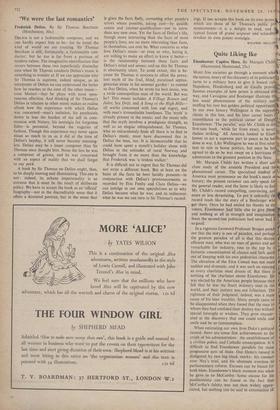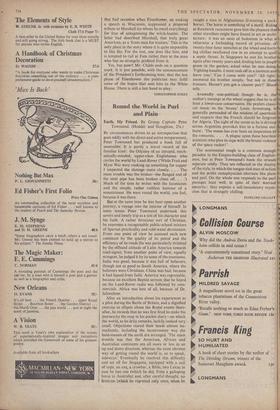Quite Liking Ike
Eisenhower: Captive Hero. By Marquis Child (Hammond, Hammond, 25s.) MOST free societies go through a moment wh the nation, weary of the chicanery of its politician turns to a military hero to give it honest rul Napoleon, Hindenburg and de Gaulle provi • famous examples of how power is obtained t way, and Cavaignac and Boulanger illustrate t less usual phenomenon of the military m muffing his rare but golden political opportuni
In our own history Wellington is the supre classic in this line, and his later career bears resemblance to the political career of Dwig Eisenhower. 'The parallel,' says Mr. Childs in th first-rate book, 'while far from exact, is never• theless striking.' All America looked to Eisen- hower to act a supreme part in peace as he had done in war. Like Wellington he was at first reluc- tant to mix in home politics, but once he had agreed to do so he was swept on a hurricane of admiration to the greatest position in the State.
Mr. Marquis Childs has written a short and close study of the amiable President and his phenomenal career. The specialised student of America must pronounce on the book's merit as history; the present reviewer can only speak for the general reader, and the latter is likely to find Mr. Childs's record compelling, convincing, and more or less devastating. To put it unkindly the record reads like the story of a Boulanger who got there. Once he had smiled his thanks to the voters, Eisenhower had little else to give them, and nothing at all in strength and imagination, Soon the seconcHine politicians had never had it so good.
In a vigorous foreword Professor Brogan points out that the story is one of paradox, and perhapl the greatest paradox of all is that this• decent, efficient man, who was no man of genius and not remarkable for industry, rose to the top by a fantastic concatenation of chance and luck quite out of keeping with his own pedestrian character. The elevation of the First Consul was not more sudden and dramatic, and it was such an opening as every charlatan must dream of. But there is nothing of the charlatan about Eisenhower. fle was elected by the American people because they felt that he was the finest ordinary man in the world, and their instinct was not fallacious. The rightness of their judgment, indeed, was a main cause of his later troubles. Many people came to be disappointed when they found that the man to whom they had confided their destiny was without special foresight or wisdom. They grew exasper- ated at the discovery that one could smile and smile and be so commonplace.
When estimating our own Iron Duke's political record, there are some fine achievements to the credit of his administration : the establishment of a civilian police, and Catholic emancipation. It is difficult to find Eisenhower parallels for these progressive acts of State. Our Duke's record is disfigured by two big black marks: his conduct over Ney's trial, and his obstinate aversion to parliamentary reform. Excuses can be found for both blots. Eisenhower's black moment was when he gave in to McCarthy. Some excuse for his pusillanimity can be found in the fact that McCarthy's falsity was not then widely appre- ciated, but nothing can be said in extenuation of that bad occasion when Eisenhower, on making a speech in Wisconsin, suppressed a prepared tribute to Marshall (to whom he owed everything) for fear of antagonising the witch-hunter. The latter had described Marshall, that truly great American, as a 'front man for traitors.' This is the only place in the story where it is quite impossible to like Ike. For the rest, one does like him, and is tempted to rail at Fate rather than at the man who has so strangely profited from it.
Yes, but now? Mr. Childs .ends on a question mark. It is just possible, with the announcement of the President's forthcoming tour, that the last phase of Eisenhower the politician may fulfil some of the hopes that sent him to the White House. There is still a last hand to play.
CHRISTOPHER SYKES







































































 Previous page
Previous page